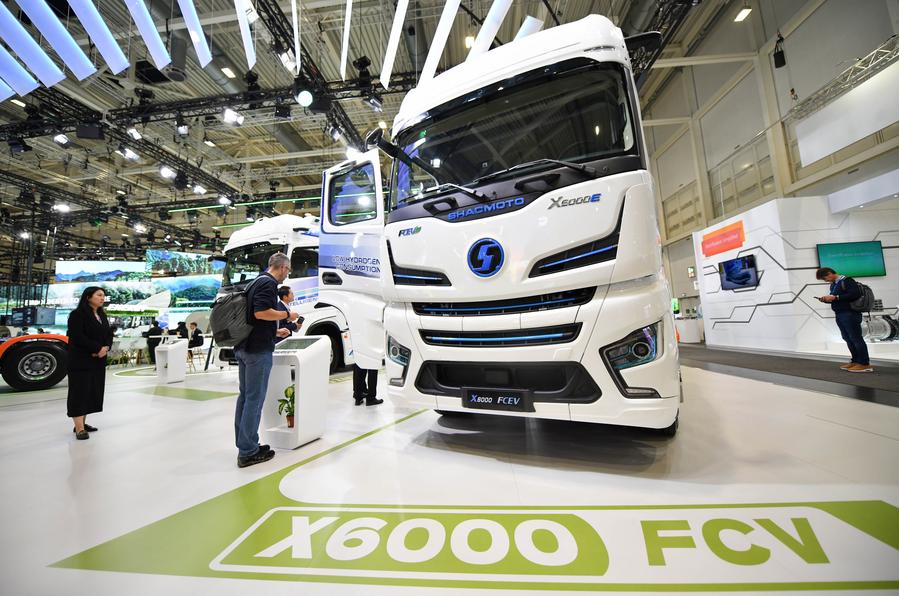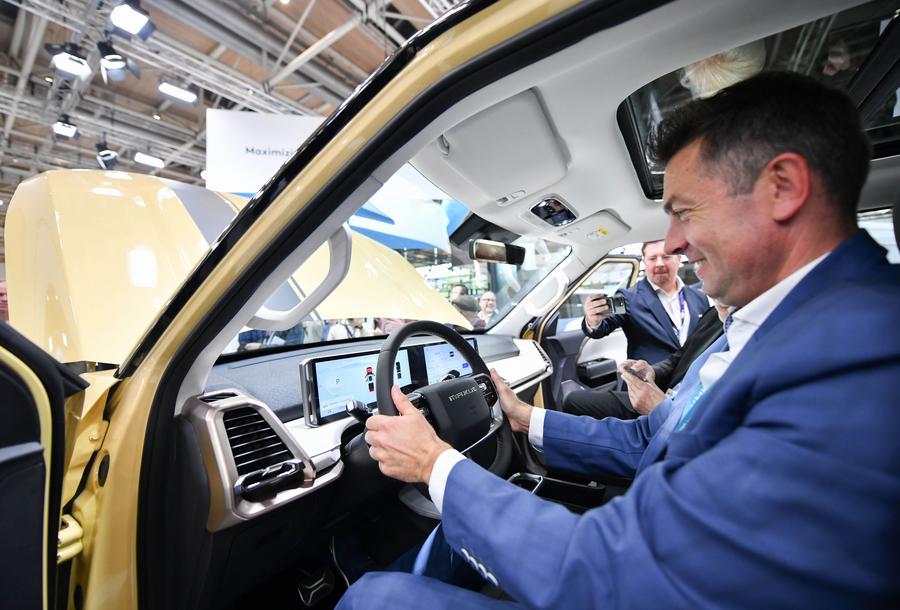Stefan Hartung, chairman of Robert Bosch GmbH, speaks in an interview at the International Motor Show (IAA) Transportation 2024 in Hannover, Germany, on Sept. 16, 2024. (Xinhua/Jia Jinming)
Bosch Chairman Stefan Hartung has said China is transforming from a consumer market to a innovation hub.
HANNOVER, Germany, Sept. 18 (Xinhua) -- "China is transforming from a consumer market into a center of knowledge and innovation," said Stefan Hartung, chairman of Robert Bosch GmbH, in an exclusive interview with Xinhua at the International Motor Show (IAA) Transportation 2024 in Hannover, Germany.
Hartung underscored China's steady progress in expanding its production capabilities and its increasing role in global innovation. Bosch, he noted, plans to continue making long-term investments in China to meet rising market demand.
As a frequent traveler to China, Hartung has gained deep insights into the Chinese market. "China is a very important market for us. We have achieved significant success, and our investments continue to grow. Next month, a new plant for key components of new energy vehicles, which we've been preparing for months, will soon be operational," Hartung said.
He also predicted that electric vehicles will become a key part of the global passenger car market in the next decade. However, in the commercial vehicle sector, he said that some markets may favor hydrogen solutions, including fuel cells and hydrogen combustion engines.
Hartung emphasized that multiple powertrain technologies could coexist, with the best solution selected based on specific needs rather than competition. Bosch, he said, is committed to diversifying its offerings, from battery systems to fuel cell systems and hydrogen-powered technologies.

Visitors learn about a hydrogen fuel cell tractor at booth of the Shaanxi Automobile Holding Group Co., Ltd. (SHACMAN) during the media preview of the International Motor Show (IAA) Transportation 2024 in Hannover, Germany, Sept. 16, 2024. (Xinhua/Ren Pengfei)
"The global automotive market has remained stable this year, but electric vehicle growth has been slower than expected, particularly in China. Demand for plug-in hybrid and range-extended electric vehicles has increased, while growth for pure electric vehicles has slowed," Hartung noted, urging the industry to adjust its strategies to reflect this trend.
The technologies showcased by Bosch at the IAA Transportation 2024, Hartung revealed, were products of close European-Chinese collaboration. "Most technology cannot be developed by just one individual or a small team and then applied worldwide," he said. Hartung expects international cooperation, especially in hydrogen technology and electric trucks, to lead to further breakthroughs.
As a global company, Bosch advocates for a balanced and fair competitive environment in international markets. Hartung warned that tariffs and subsidies in response to trade issues could lead to higher prices and instability in the global market.
Hartung expressed hope that trade negotiations between China and the European Union would resolve ongoing tariff issues, emphasizing the need for a trade agreement. "We hope that a trade agreement can eventually be reached between China and the European Union, addressing the issue of tariffs through negotiations."

A man tries an electric pickup truck at the booth of Chinese automaker SAIC Maxus during the media preview of the International Motor Show (IAA) Transportation 2024 in Hannover, Germany, Sept. 16, 2024. (Xinhua/Ren Pengfei)
Looking forward, Hartung emphasized that further trade liberalization is key to global economic growth. "It would be great if as much international trade as possible continues over the next decades because that has helped the whole world, including China, so much in the last decades," he said, voicing optimism that Bosch will benefit from this trend.
Hartung also stressed the importance of ongoing communication and cross-border talent exchanges, particularly among engineers and technical professionals. Bosch's research and development operations in China have expanded, with 58,000 employees, including 10,000 engineers and researchers, achieving breakthroughs by leveraging local talent and innovation in China.
Hartung noted that China has become a global innovation center, driving change in electrification, smart mobility, artificial intelligence, digitalization, and energy efficiency. This shift toward a technology-driven future is being powered by cross-border collaboration, which Hartung sees as crucial for both China and Europe.
Deeper international cooperation will continue to drive innovation in these key fields, reinforcing China's status as a global center of technological development, he noted.
(Editor: wangsu )


